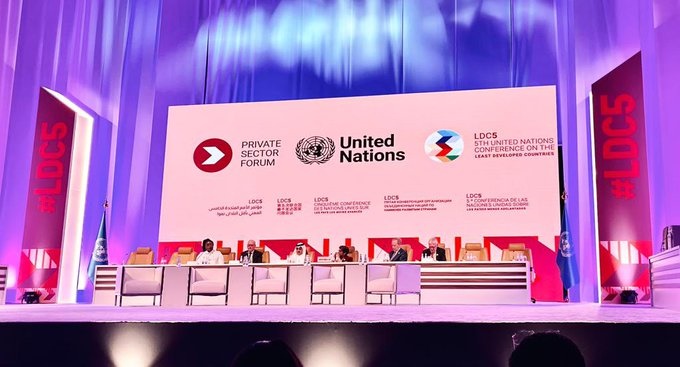At the 5th UN Conference on Least Developed Countries (LDC5) in Qatar, the Republic of Guinea-Bissau and the European Investment Bank (EIB Global) have announced the signature and first stage implementation of the technical assistance cooperation agreement for the Guinea-Bissau Resilient Road Corridor project, which forms part of the Praia-Dakar-Abidjan Strategic Corridor.

This Global Gateway flagship, which will enhance mobility and trade in a sustainable and safe manner, is currently being implemented by the European Investment Bank. Subject to approvals, it should benefit from a grant from the European Union (EU) as well as EIB financing in the coming months.
The cooperation agreement was signed by Guinea-Bissau’s Minister of Finance Ilídio Vieira Té, EIB Vice-President Thomas Östros, and EU Commissioner for International Partnerships Jutta Urpilainen.
Guinea-Bissau’s Minister of Finance, Ilídio Vieira Té, said: “First of all, on behalf of the Government of Guinea-Bissau, I would like to express my great satisfaction on this important day for my country. Its marks the signing of the cooperation agreement with EIB Global the European Investment Bank (EIB Global) to provide technical assistance for the SAFIM-MPACK road corridor. I believe that this day will also bring the relaunch of the financing operations of projects.
“The rehabilitation of the road that connects SAFIM to MPACK is an emblematic project of our cooperation and testimony of how much the European Union and its bank the EIB, are committed to helping Guinea-Bissau find the best development path. This project, as part of the Trans-West African Coastal Highway, should contribute to increasing intra-regional trade and economic efficiency while representing the main means of transport for most rural communities.”
EIB Vice-President, Thomas Östros, said: “I am proud that, at the EIB, we are mobilising our vast expertise to support the implementation of this strategic and impactful project for the region. As part of the Praia-Dakar-Abidjan corridor, it will directly benefit the local population by facilitating mobility – including improved access to health and education, particularly for women and children in rural areas. It is a true flagship project supported by EIB Global, our new arm dedicated to development and international partnerships outside the European Union. I hope that this project will be followed by many other projects in various key sectors for Guinea-Bissau benefiting from both EIB and EU support.”
European Commissioner for International Partnerships, Jutta Urpilainen, said: “The Resilient Road Corridor project to rehabilitate the main road that connects the Guinea Bissau capital with Senegal is a true flagship EU-Africa Global Gateway project. As part of the Praia-Dakar-Abidjan Strategic Corridor, it will facilitate mobility and trade in Africa, and between Africa and Europe. The technical assistance agreement signed today is an important step forward in enhancing and greening connectivity, and I look forward to the next steps.”
The first stage launch of this new technical assistance agreement of up to €3.5 million marks an important step forward in the implementation of this road corridor project in Guinea-Bissau in terms of procurement, environmental and social safeguards management, road safety, climate resilience and reporting.
It will facilitate the rehabilitation, including climate change resilience enhancement, of a 115 km section of the N2 road (Bissau-Mpack) between Safim, north of the capital Bissau, and the Mpack border crossing with Senegal. The N2 is part of the Dakar-Lagos Trans-African Highway Corridor No 7 (TAH-7) and the only paved road connecting Guinea-Bissau to external markets.
This road corridor plays an essential role in trade between Guinea-Bissau and the wider region. Once completed, the project is expected to facilitate the mobility of the local population while contributing significantly to Guinea-Bissau’s regional integration efforts. Furthermore, the project will improve people’s access to health and education as well as enhancing economic activities along the corridor and beyond. Improved access to health services will, in particular, benefit women and children in the rural areas that will be served by the corridor.
